用Excel宏实现工资表巧转工资条
EXCEL工资表转工资条,做好模板,下次直接套用
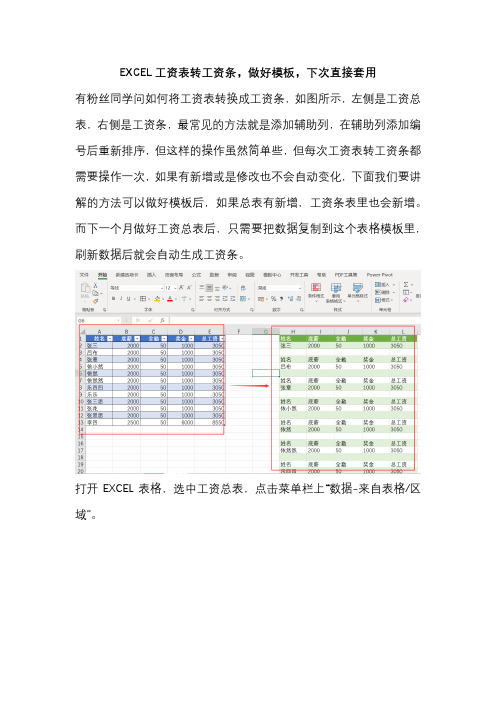
EXCEL工资表转工资条,做好模板,下次直接套用有粉丝同学问如何将工资表转换成工资条,如图所示,左侧是工资总表,右侧是工资条,最常见的方法就是添加辅助列,在辅助列添加编号后重新排序,但这样的操作虽然简单些,但每次工资表转工资条都需要操作一次,如果有新增或是修改也不会自动变化,下面我们要讲解的方法可以做好模板后,如果总表有新增,工资条表里也会新增。
而下一个月做好工资总表后,只需要把数据复制到这个表格模板里,刷新数据后就会自动生成工资条。
打开EXCEL表格,选中工资总表,点击菜单栏上“数据-来自表格/区域”。
弹出Power Query编辑器(后面简称PQ),点击左上角“关闭并上载”,下拉选择“关闭并上载至”。
弹出窗口,选择数据放置的位置,可以放入到不同的工作表里,这里演示为方便对比数据,勾选放置在现有工作表的“H1”列。
点击确定后,H1单元格开始自动生成和原表一样的超级数据表,原表也自动转成超级表格,选中表格里的表头,按下复制键,点击右侧的表格,菜单栏上新增加“查询”选项卡。
点击左上角“编辑”,弹出PQ窗口。
点击“添加列”选项卡,单击“自定义列”,弹出窗口,在自定义列公式里输入英文引号,并在中间按下粘贴键,这样前面复制的表头信息,粘贴在这。
同样的操作,再增加一列,这里输入英文引号,在中间添加一个空格。
点击确定后,选中表格前面的所有数据(除掉“自定义的两列数据”),点击菜单栏上“合并列”,弹出窗口,选择“分隔符”为制表符。
点击确定,单击鼠标右键,选择“删除列”。
这时,表格里剩下三列数据,第一列是新增加的表头,第二列是新增加的空白,第三列是上一步合并的数据,将空白列移动到最右边,选中整三列数据,点击菜单栏上“转换-逆透视列”。
删除前面的“属性”列,选中剩下的这列数据,点击菜单栏上“转换-拆分列-按分隔符”。
弹出窗口,选择分隔符为“制表符”。
表格里一列数据分成多列,点击左上角“将第一行用作标题”。
全选表格,点击“替换值”,弹出窗口,将表格里的“null”删除,在“要查找的值”输入框里输入“null”,在“替换为”输入框里啥也不用输入。
Excel工资表自动生成工资条_详细图文教程
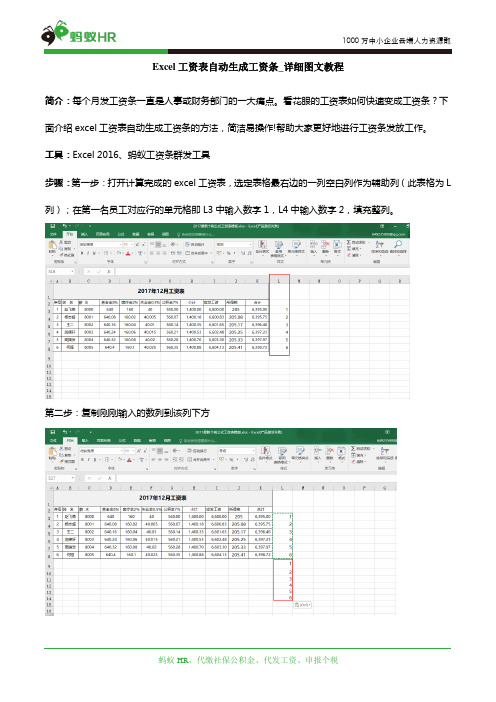
Excel工资表自动生成工资条_详细图文教程简介:每个月发工资条一直是人事或财务部门的一大痛点。
看花眼的工资表如何快速变成工资条?下面介绍excel工资表自动生成工资条的方法,简洁易操作!帮助大家更好地进行工资条发放工作。
工具:Excel 2016、蚂蚁工资条群发工具步骤:第一步:打开计算完成的excel工资表,选定表格最右边的一列空白列作为辅助列(此表格为L 列);在第一名员工对应行的单元格即L3中输入数字1,L4中输入数字2,填充整列。
第二步:复制刚刚输入的数列到该列下方第三步:选中L列任一单元格,点击菜单栏【数据】选项卡,选择排序中的【升序】符号。
如下图所示,L列会自动按数字大小排序,每行员工工资下会生成一行空行。
第四步:选择工资表表头数据,按“Ctrl+C”复制表头;然后选中工资表数据部分,选择【开始】选项卡,在【编辑】模块中,点击【查找和选择】,在【定位条件】中选择【空值】。
第五步:工资表的所有空值被选中,按“C trl+V"粘贴表头数据,再设置一下边框格式和底纹,工资条便制作完成啦!制作完成的工资条可以打印裁剪或者截图发放给员工。
如若企业人数众多,薪资项目繁杂,那么这种方法较为繁琐也容易出错,便不适用。
推荐大家使用电子工资条发放工具,一键群发工资条,省去剪纸条的麻烦。
小编使用的是【蚂蚁工资条】系统,操作简洁易用,安全可靠。
可以通过短信、邮件还有微信的方式将工资条发放给员工。
下面说说蚂蚁工资条系统使用方法。
第一步:打开蚂蚁工资条首页,无需下载模板,在你日常使用的工资表中加入一列手机号或者邮箱,直接上传工资表。
第二步:核对数据是否准确,数据无误直接点击页面底部的“下一步”。
第三步:立即发送或选择预约发送,员工可即刻收到带有工资条信息的短信或者邮件。
关注”蚂蚁工资条“公众号还可查看对应的微信工资条。
?。
Excel技巧应用篇:将工资明细表转换成工资条格式
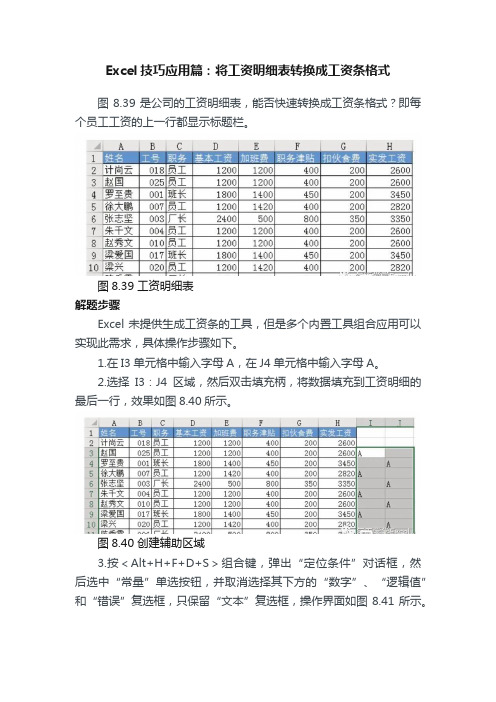
Excel技巧应用篇:将工资明细表转换成工资条格式图 8.39 是公司的工资明细表,能否快速转换成工资条格式?即每个员工工资的上一行都显示标题栏。
图8.39 工资明细表解题步骤Excel未提供生成工资条的工具,但是多个内置工具组合应用可以实现此需求,具体操作步骤如下。
1.在I3单元格中输入字母A,在J4单元格中输入字母A。
2.选择I3:J4区域,然后双击填充柄,将数据填充到工资明细的最后一行,效果如图8.40所示。
图8.40 创建辅助区域3.按<Alt+H+F+D+S>组合键,弹出“定位条件”对话框,然后选中“常量”单选按钮,并取消选择其下方的“数字”、“逻辑值”和“错误”复选框,只保留“文本”复选框,操作界面如图8.41所示。
图8.41 设置定位选项4.单击“确定”按钮执行定位,然后右键单击任意一个已选中的单元格,并从右键菜单中选择“插入”,弹出“插入”对话框。
5.选择“插入”对话框中的“整行”,然后单击“确定”按钮执行插入行操作。
图8.42展示了插入方式的设置界面,图8.43则是插入整行后的效果。
图8.42 设置插入方式图8.43 插入空行后的效果6.复制第一行。
7.选择A1:A20,然后按<Alt+H+F+D+S>组合键,弹出“定位条件”对话框,然后选中“空值”单选按钮,并单击“确定”按钮执行定位。
图8.44是定位条件设置界面,图8.45则是定位效果。
图8.44 设置定位条件图8.45 定位效果8.按组合键<Ctrl+V>,粘贴标题到空行中,粘贴后效果如图8.46所示。
图8.46 复制标题到空行9.删除I:J区域的辅助数据。
知识扩展1.本例的重点在于辅助区域的应用,通过辅助区域定位需要插入行的单元格。
当插入空行后,其他操作都相当简单。
使用辅助区域时要注意两点,其一是输入的字符没有任何限制,使用任何字符都可以,而非只能使用字母“A”;其二是必须从第二个职员信息处开始,因为第一个职员的工资信息上方已经存在标题行。
EXCEL自动生成工资条方法
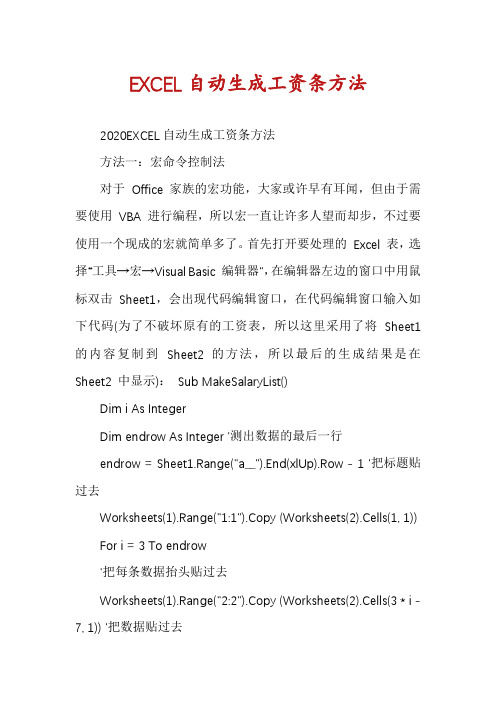
EXCEL自动生成工资条方法2020EXCEL自动生成工资条方法方法一:宏命令控制法对于Office 家族的宏功能,大家或许早有耳闻,但由于需要使用VBA 进行编程,所以宏一直让许多人望而却步,不过要使用一个现成的宏就简单多了。
首先打开要处理的Excel 表,选择“工具→宏→Visual Basic 编辑器”,在编辑器左边的窗口中用鼠标双击Sheet1,会出现代码编辑窗口,在代码编辑窗口输入如下代码(为了不破坏原有的工资表,所以这里采用了将Sheet1 的内容复制到Sheet2 的方法,所以最后的生成结果是在Sheet2 中显示):Sub MakeSalaryList()Dim i As IntegerDim endrow As Integer '测出数据的最后一行endrow = Sheet1.Range("a__").End(xlUp).Row - 1 '把标题贴过去Worksheets(1).Range("1:1").Copy (Worksheets(2).Cells(1, 1)) For i = 3 To endrow'把每条数据抬头贴过去Worksheets(1).Range("2:2").Copy (Worksheets(2).Cells(3 * i - 7, 1)) '把数据贴过去Worksheets(1).Range(Cells(i, 1), Cells(i, 256)).Copy (Worksheets(2).Cells(3 * i - 6, 1)) Next iEnd Sub关闭编辑器,将自动返回到刚才的Excel 表,选择“工具→宏→宏”,将弹出如下对话框:点击“执行”,将在Sheet2 生成如Gz-2 所示的转换成工资条,怎样,不复杂吧。
当然,如果你的表总Sheet2 已经输入了别的内容,就可以将他复制到Sheet3 来生成,代码修改也很简单,把其中的Sheet2 修改成Sheet3 就可以了,其它代码不变。
Excel.VBA如何一键生成工资条

Excel.VBA如何一键生成工资条1.将过程指定给按钮,实现工作的一键完成操作见下图:2.调出VBE的本地窗口做代码调试,帮助自己快速掌握代码的运行规律操作如下图:接下来我就不废话了,正式进入今天的主题,我今天分享的案例是:一键生成工资条,要求:将图一处理成图二的样子其实这个题的代码很简单涉及的知识点:1.关闭闪屏:代码Application.ScreenUpdating = FalseApplication.ScreenUpdating = True此类型代码一般都是成对出现,一般在过程的开头“禁用”某功能,但在过程的结尾就要“恢复”Excel程序的该项功能。
2.获取A列有效数据所在的最大行号iLastRow = Range('A' &Rows.Count).End(xlUp).RowEnd(xlup)的功能就类似于按住“ctrl 向上方向键”,这里之所以选择xlup向上的方向键,是因为我选择的起点单元格Range('A'& Rows.Count)是A列的最后一个单元格,Rows.Count前面没有指定词的话就是指对应Excel工作表的最大的那一行的行数,2003版是65536行;2007版以后的版本都是1048576行。
如果起点单元格是A1单元格的话,那End的参数就应该选择xlDown另外获取A1单元格的连续区域的行数还有一种写法:即:Range('A1').CurrentRegion.Rows.CountCurrentRegion即指连续区域3.倒循环——对、没错,原来循环还可以倒着走For i = iLastRow T o 3 Step -1Range('A' & i).Resize(2,1).EntireRow.InsertRange('A' & i 1).Resize(1,8).Value = Range('A1').Resize(1, 8).ValueNext i所谓的倒循环就是将对应循环变量i的步长值做减法运算,Step -1 即每循环一次循环体,就减1(具体步长值可以根据需要来定,1并不是唯一值)4.关键字ResizeResize是指对单元格进行扩展;()第一个参数表示行,第二个参数表示列,参数与参数之间是以逗号为间隔的。
工资表转化为工资条
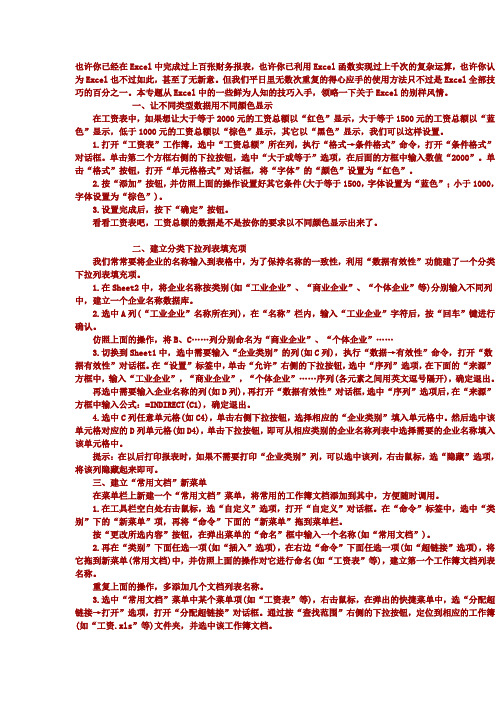
也许你已经在Excel中完成过上百张财务报表,也许你已利用Excel函数实现过上千次的复杂运算,也许你认为Excel也不过如此,甚至了无新意。
但我们平日里无数次重复的得心应手的使用方法只不过是Excel全部技巧的百分之一。
本专题从Excel中的一些鲜为人知的技巧入手,领略一下关于Excel的别样风情。
一、让不同类型数据用不同颜色显示在工资表中,如果想让大于等于2000元的工资总额以“红色”显示,大于等于1500元的工资总额以“蓝色”显示,低于1000元的工资总额以“棕色”显示,其它以“黑色”显示,我们可以这样设置。
1.打开“工资表”工作簿,选中“工资总额”所在列,执行“格式→条件格式”命令,打开“条件格式”对话框。
单击第二个方框右侧的下拉按钮,选中“大于或等于”选项,在后面的方框中输入数值“2000”。
单击“格式”按钮,打开“单元格格式”对话框,将“字体”的“颜色”设置为“红色”。
2.按“添加”按钮,并仿照上面的操作设置好其它条件(大于等于1500,字体设置为“蓝色”;小于1000,字体设置为“棕色”)。
3.设置完成后,按下“确定”按钮。
看看工资表吧,工资总额的数据是不是按你的要求以不同颜色显示出来了。
二、建立分类下拉列表填充项我们常常要将企业的名称输入到表格中,为了保持名称的一致性,利用“数据有效性”功能建了一个分类下拉列表填充项。
1.在Sheet2中,将企业名称按类别(如“工业企业”、“商业企业”、“个体企业”等)分别输入不同列中,建立一个企业名称数据库。
2.选中A列(“工业企业”名称所在列),在“名称”栏内,输入“工业企业”字符后,按“回车”键进行确认。
仿照上面的操作,将B、C……列分别命名为“商业企业”、“个体企业”……3.切换到Sheet1中,选中需要输入“企业类别”的列(如C列),执行“数据→有效性”命令,打开“数据有效性”对话框。
在“设置”标签中,单击“允许”右侧的下拉按钮,选中“序列”选项,在下面的“来源”方框中,输入“工业企业”,“商业企业”,“个体企业”……序列(各元素之间用英文逗号隔开),确定退出。
如何将Excel的工资表转为工资条
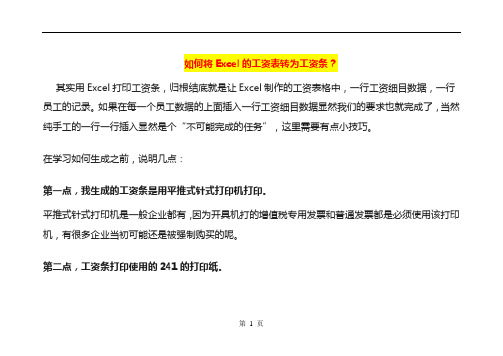
如何将Excel的工资表转为工资条?
其实用Excel打印工资条,归根结底就是让Excel制作的工资表格中,一行工资细目数据,一行员工的记录。
如果在每一个员工数据的上面插入一行工资细目数据显然我们的要求也就完成了,当然纯手工的一行一行插入显然是个“不可能完成的任务”,这里需要有点小技巧。
在学习如何生成之前,说明几点:
第一点,我生成的工资条是用平推式针式打印机打印。
平推式针式打印机是一般企业都有,因为开具机打的增值税专用发票和普通发票都是必须使用该打印机,有很多企业当初可能还是被强制购买的呢。
第二点,工资条打印使用的241的打印纸。
什么是241的打印纸呢?就是常见的两边带孔的打印纸,类似于增值税专用发票那种,纸的宽度是24.10cm,现在很多企业财务电算化后都是使用的是241-1/2规格的打印纸作为会计凭证打印纸的。
第三点,需要先设置电脑中“打印机”的纸张规格。
为什么要进行这个设置呢?因为有可能我们需要的纸张规格在电脑系统是没有自带的,需要我们手动新增。
请看我的以下步骤,如果对电脑不熟悉的可以找一个比较熟悉的操作。
点击“开始”→“控制面板”→“打印机和传真”→对准空白处点击鼠标的右键,会出现以下图标:
点击最后的“服务器属性”,进入:。
Excel VBA编程 典型实例——制作工资条
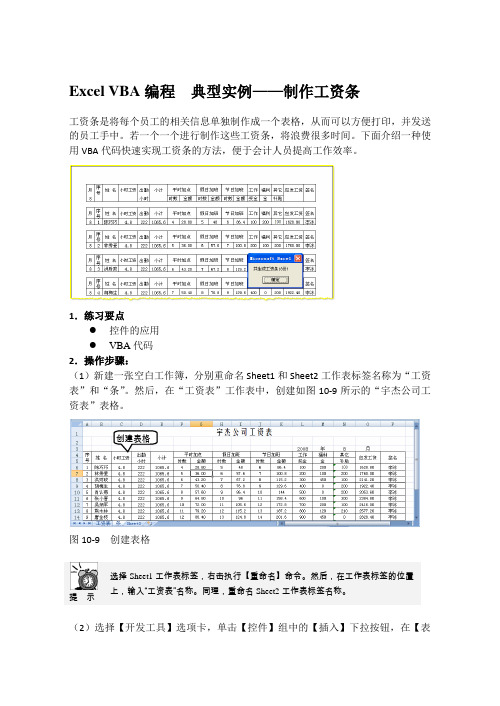
Excel VBA编程典型实例——制作工资条工资条是将每个员工的相关信息单独制作成一个表格,从而可以方便打印,并发送的员工手中。
若一个一个进行制作这些工资条,将浪费很多时间。
下面介绍一种使用VBA代码快速实现工资条的方法,便于会计人员提高工作效率。
1.练习要点●控件的应用●VBA代码2.操作步骤:(1)新建一张空白工作簿,分别重命名Sheet1和Sheet2工作表标签名称为“工资表”和“条”。
然后,在“工资表”工作表中,创建如图10-9所示的“宇杰公司工资表”表格。
图10-9 创建表格提示选择Sheet1工作表标签,右击执行【重命名】命令。
然后,在工作表标签的位置上,输入“工资表”名称。
同理,重命名Sheet2工作表标签名称。
(2)选择【开发工具】选项卡,单击【控件】组中的【插入】下拉按钮,在【表创建表格单控件】组中,选择【按钮(窗体控件)】按钮。
然后,在“工资表”中,给制该形状,如图10-10所示。
此时,将弹出一个【指定宏】对话框,将【宏名】修改为“工资条”文字。
图10-10 绘制【按钮(窗体控件)】按钮提 示由于本例使用的是VBA 进行编辑代码来生成工资条,所以在绘制【按钮(窗体控件)】按钮时,弹出的对话框可以单击【取消】按钮,无须进行录制宏操作。
(3)右击绘制的控件按钮,执行【编辑文字】命令。
然后,修改按钮名称为“生成工资条”文字,如图10-11所示。
图10-11 修改控件名称(4)选择【开发工具】选项卡,单击【代码】组中的Visual Basic 按钮,如图10-12所示。
图10-12 单击Visual Basic 按钮选择绘制修改执行效果单击(5)在弹出的VBE 窗口中,右击【工程管理器】窗口的空白处,执行【插入】|【模块】命令,即可插入一个模块1,如图10-13所示。
图10-13 插入模块提 示双击【工程管理器】窗口中的【模块1】按钮,即可弹出一个代码编辑窗口。
(6)在弹出的代码编辑窗口中,输入如图10-14所示的代码。
用EXCEL宏实现工资表巧转工资条

用E X C E L宏实现工资表巧转工资条Modified by JEEP on December 26th, 2020.用Excel宏实现工资表巧转工资条赛迪网--中国电脑教育报文/邓亚思Excel具有强大的数据处理和打印输出功能,并且易学易用,是广大用户喜欢使用的电子表格处理软件。
现在一些单位的财会人员喜欢用Excel打印本单位的职工工资总表与工资条,但在Excel中要将工资总表(如表1)手工地转换为工资条(如表2)则是一件比较烦琐的事,下面是我编写的一个Excel宏,运行这个宏就可将编辑好了的工资总表很方便地转换为工资条打印输出。
在Excel中新建一个文件,将其命名为“工资表与工资条”,在工作表“sheet1”中输入并编辑好本单位职工工资总表(如表1所示)后,点击“工具”菜单→“宏”→“宏…”→输入宏名“生成工资条”→创建,输入如下的宏的各行文本,输入完成后保存该宏。
将工作表“sheet1”复制为另一个工作表“sheet2”中,使“sheet2”成为当前工作表,执行刚才创建的宏,即可很快将表1所示的工资表转换为表2所示的工资条。
宏的内容如下:Sub 生成工资条()'选择整个表去掉表格线Range("F1").Activate(xlDiagonalDown).LineStyle = xlNone(xlDiagonalUp).LineStyle = xlNone(xlEdgeLeft).LineStyle = xlNone(xlEdgeTop).LineStyle = xlNone (xlEdgeBottom).LineStyle = xlNone (xlEdgeRight).LineStyle = xlNone (xlInsideVertical).LineStyle = xlNone (xlInsideHorizontal).LineStyle = xlNone Rows("2:2").Select'选择第2行Shift:=xlDown'在第2行前插入一行,保持第2行为选中状态num=150'总人数×3,如工资表中有100人则为100×3即num=300col=14'工资表的栏数,如工资表有17栏则'col=17num1 = 4Do While num1 <= num'循环插入空行Range(Cells(num1, 1), Cells(num1, col)).Select '选中第num1行的第1列到第col列Shift:=xlDownShift:=xlDownnum1 = num1 + 3LoopRange(Cells(1, 1), Cells(1, col)).Select= False'剪切复制模式无效'复制选择区域Range("A2").Select'选择A2单元格'从A2单元格起粘贴内容num2 = 5Do While num2 <= num'循环插入标题行Range(Cells(1, 1), Cells(1, col)).Select = FalseCells(num2, 1).Selectnum2 = num2 + 3LoopRange(Cells(2, 1), Cells(3, col)).Select = False(xlDiagonalDown).LineStyle= xlNone'定义表格边框线、内线样式(xlDiagonalUp).LineStyle = xlNoneWith (xlEdgeLeft).LineStyle = xlDouble.Weight = xlThick.ColorIndex = xlAutomatic End WithWith (xlEdgeTop).LineStyle = xlDouble.Weight = xlThick.ColorIndex = xlAutomatic End WithWith (xlEdgeBottom).LineStyle = xlDouble.Weight = xlThick.ColorIndex = xlAutomatic End WithWith (xlEdgeRight).LineStyle = xlDouble.Weight = xlThick.ColorIndex = xlAutomaticEnd WithWith (xlInsideVertical).LineStyle = xlDash.Weight = xlThin.ColorIndex = xlAutomaticEnd WithWith (xlInsideHorizontal).LineStyle = xlDash.Weight = xlThin.ColorIndex = xlAutomaticEnd WithRange(Cells(5, 1), Cells(6, col)).SelectPaste:=xlFormats, Operation:=xlNone, SkipBlanks:= _ False, Transpose:=False'接上行删除上行尾的连字符_,复制表格线样式num3 = 8Do While num3 <= num'循环复制表格线样式Range(Cells(num3, 1), Cells(num3 + 1, col)).SelectPaste:=xlFormats, Operation:=xlNone, SkipBlanks:= _False, Transpose:=Falsenum3 = num3 + 3LoopRows("1:1").Select'删除多余的一行End Sub以后每月要打印工资表与工资条时,只需将“工资表与工资条”文件打开,修改好工作表“sheet1”中的当月的工资总表数据后将其复制为工作表“sheet2”,并使“sheet2”成为当前工作表,执行宏“生成工资条”即可。
用“宏”快速将工资表转换为工资条
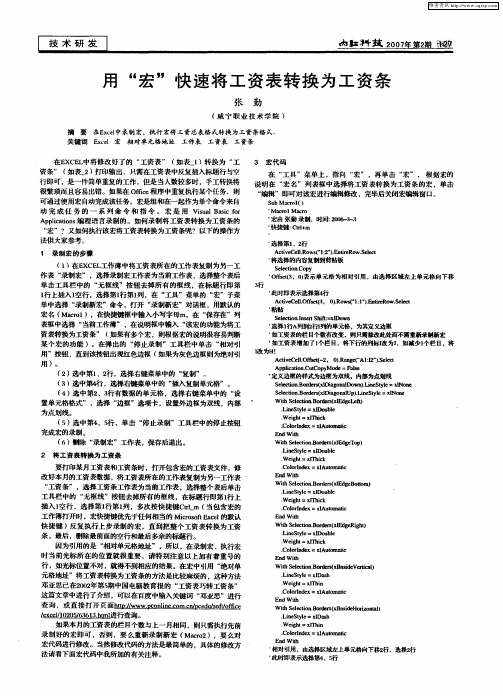
l 行上插入 l 空行 ,选择第 l 第l ,在 “ 行 列 工具 ”菜单 的 “ ”子菜 宏 单 中选择 “ 录制新宏 ”命令 ,打开 “ 录制新宏 ”对 话框 ,用默认的 宏名 ( c 1 Mar ),在快捷键框 中输入小 写字母m,在 “ o 保存在 ”列 表框 中选择 “ 当前 工作薄 ,在说明框 中输入 “ 宏的功能 为将工 该 资表转 换为工 资条” ( 如果 有多个 宏 则根 据宏的说明很容 易判断 某个 宏的 功能 )。在弹 出的 “ 停止 录制 ”工具栏 中单 击 “ 相对 引 用”按 钮 ,直到该按钮 出现红色边框 ( 果为灰色边框则为绝 对引 如
为点划线。
’ 定义边框的样式 为边框为双线 ,内部为点划线
S l t . r es xDig n l wn .ie t l =xNo e ee i Bod r( l a o aDo ) n S y e l n c o n L S lci nBod r( l a o aUp. ie t l ee t . r es xDig n l ) n S ye=xNo e o L l n W S lcin B r esxEd e e ) ee t . o d r(l g L f o i
’ 宏由 张勤 录制 ,时问: 0 6 3 3 20 - - ’ 快捷 键: t+ C r m l
’ 择第1 行 选 、2
Aci e l R ws : J t e w,ee t t Ce1 o ( 12 . i Ro S lc v . En r
( 、 ECL 1 在 X E 工作薄 中将工 资表所在的工作 表复制为另一工 作表 “ 录制宏 ”,选择录制宏工作表为 当前工作 表,选择整个表后 单 击工具栏 中的 “ 无框线 ”按 钮去 掉所有 的框线 ,在标题 行即第
学一招 excel中将工资表转为工资条
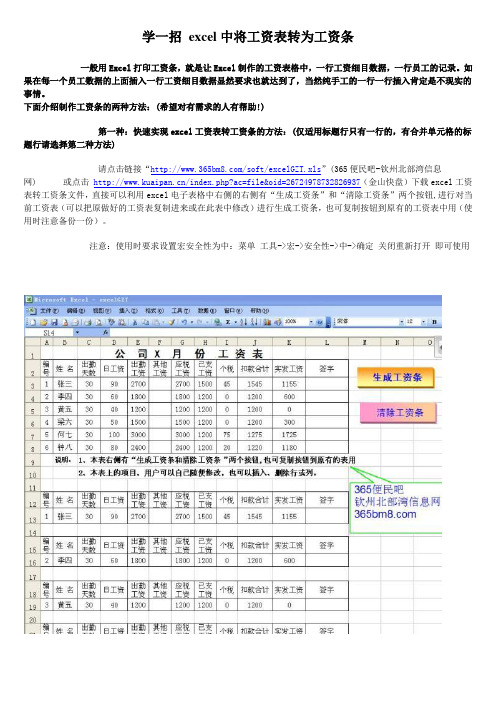
学一招excel中将工资表转为工资条一般用Excel打印工资条,就是让Excel制作的工资表格中,一行工资细目数据,一行员工的记录。
如果在每一个员工数据的上面插入一行工资细目数据显然要求也就达到了,当然纯手工的一行一行插入肯定是不现实的事情。
下面介绍制作工资条的两种方法:(希望对有需求的人有帮助!)第一种:快速实现excel工资表转工资条的方法:(仅适用标题行只有一行的,有合并单元格的标题行请选择第二种方法)请点击链接“/soft/excelGZT.xls”(365便民吧-钦州北部湾信息网) 或点击/index.php?ac=file&oid=26724978732826937(金山快盘)下载excel工资表转工资条文件,直接可以利用excel电子表格中右侧的右侧有“生成工资条”和“清除工资条”两个按钮,进行对当前工资表(可以把原做好的工资表复制进来或在此表中修改)进行生成工资条,也可复制按钮到原有的工资表中用(使用时注意备份一份)。
注意:使用时要求设置宏安全性为中:菜单工具->宏->安全性->中->确定关闭重新打开即可使用第二种:自己制作工资条的方法:第一步:在工资细目的右侧两列中,交叉输入任意数字(主要是为了后面的“空位”空值,所以数字可任意输),然后选中交叉的四个单元格,双击右下角的“填充柄”(或按住鼠标左键拖动),使这种格式一直填充至工资表的结束行。
如图1第二步选择刚才填充的数据:执行“编辑”→“定位”命令,在打开的“定位”对话框中单击“定位条件”按钮,在打开的“定位条件”对话框中,选择“空值”,然后单击“确定”按钮(如图 2)。
第三步定位空行:执行“插入”→“行”命令,这时便会从第三行开始,每一行的前面插入了一个空行。
如果标题行是由2行组成的,还要选中工资表A列的数据区域,执行“编辑”→“定位”命令,在打开的“定位”对话框中单击“定位条件”按钮,在打开的“定位条件”对话框中,选择“空值”,然后单击“确定”按钮,然后执行“插入”→“行”命令,这时便会从第三行开始,每一行的前面插入了多一个空行(最终有2个空行)。
工资表转换成工资条方法整理,各种方法,快速转变正式版
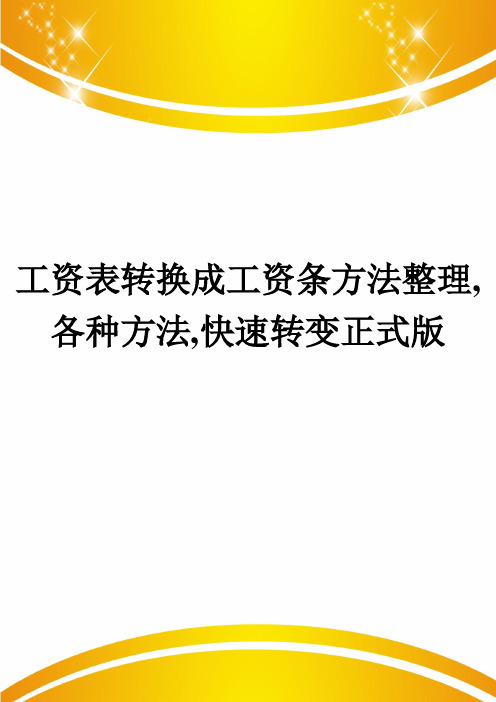
工资表转换成工资条方法整理,各种方法,快速转变正式版方法一:①:右侧两列中,交叉输入任意数字,然后选中交叉的四个单元格,双击右下角的“填充柄”,使这种格式一直填充至工资表的结束行(如图)。
②:“编辑”→“定位”→“空值”→“确定”。
③:“插入”→“行”。
④:复制表头的细目,选中A列区域,“编辑”→“定位”→“空值”→“确定”,这时会选中刚插入的空行,“编辑”→“粘贴”。
制作完成。
方法二:①:如果第一张表为“工资表”,单击Sheet2标签,重命名为“工资条1”,在“工资条1”工作表的A1单元格中输入=IF(MOD(ROW(),3)=0,"",IF(MOD(ROW(),3)=1, 工资表!A$1,INDEX(工资表!$A:$N,INT((ROW()+4)/3),COLUMN())))。
回车。
②:选定A1单元格,向右填充拖到J1单元格(注:拖的长度应与原表长度相同)。
③:选择A1:J1区域向下拖→拖到最后一行即可(注:拖的时候可能拖多或拖少,这时要看一下原表),加一下边框便成功了方法三:本工资簿包含两张表。
第1张表就是工资表。
它第一行为标题行包括序号、姓名、工资项目。
第2张表就是供打印的表,称为“工资条”。
它应设置为每三行一组,每组第一行为标题,第二为序号、姓名和各项数据,第三行为空白行。
就是说能被3整除的行为为空行,整张表被3除余1的行为标题行,引用标题行,被3除余2的行为各项数据的行。
用INDEX(区域,行,列)函数引用,公式为:=IF(MOD(ROW(),3)=0,"",IF(MOD(ROW(),3)=1,工资表!A$1,INDEX(工资表!$A:$M, (ROW()+4)/3,COLUMN())))语法解释:如果行数除3余数为0,则空;如果行数除3余数为1,则取工资表A到M列,第1行(不可引用);如果如果行数除3余数为2,则返回工资表A到M列,,对应的列;行+4/3解释:行+4/3:行是工资条的行2,5,8,11……的行+4/3是返回的工资表是的对应的2,3,4行。
如何将工资表格模板转为工资条
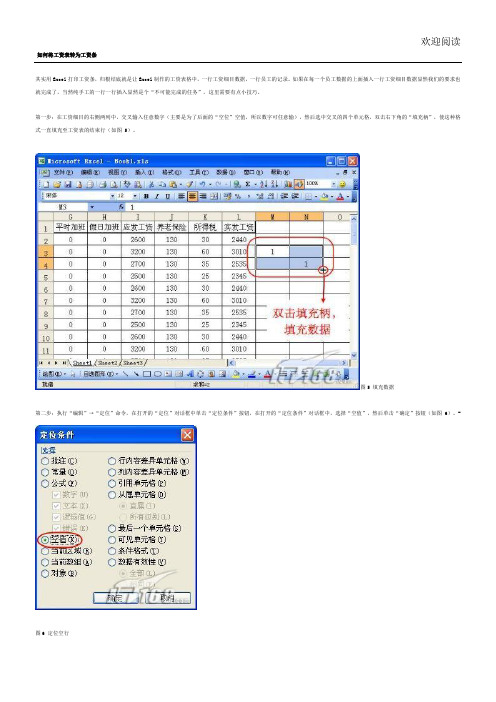
欢迎阅读如何将工资表转为工资条
其实用Excel打印工资条,归根结底就是让Excel制作的工资表格中,一行工资细目数据,一行员工的记录。
如果在每一个员工数据的上面插入一行工资细目数据显然我们的要求也就完成了,当然纯手工的一行一行插入显然是个“不可能完成的任务”,这里需要有点小技巧。
第一步:在工资细目的右侧两列中,交叉输入任意数字(主要是为了后面的“空位”空值,所以数字可任意输),然后选中交叉的四个单元格,双击右下角的“填充柄”,使这种格式一直填充至工资表的结束行(如图 5)。
图
-
6)。
图6 定位空行
欢迎阅读
第三步:执行“插入”→“行”命令,这时便会从第三行开始,每一行的前面插入了一个空行。
第四步:复制表头的工资细目数据,选中工资表A列的数据区域,执行“编辑”→“定位”命令,在打开的“定位”对话框中单击“定位条件”按钮,在打开的“定位条件”对话框中,选择“空值”,然后单击“确定”按钮,这时会选中刚插入的空行,执行“编辑”→“粘贴”命令,这时工资条就算制作完成了(如图 7)。
图
四、小结
一提到用Excel-。
excel工资表变工资条最简单的方法
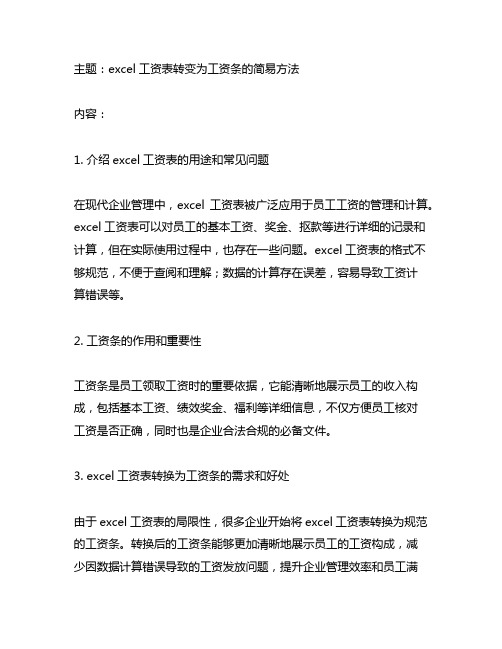
主题:excel工资表转变为工资条的简易方法内容:1. 介绍excel工资表的用途和常见问题在现代企业管理中,excel工资表被广泛应用于员工工资的管理和计算。
excel工资表可以对员工的基本工资、奖金、抠款等进行详细的记录和计算,但在实际使用过程中,也存在一些问题。
excel工资表的格式不够规范,不便于查阅和理解;数据的计算存在误差,容易导致工资计算错误等。
2. 工资条的作用和重要性工资条是员工领取工资时的重要依据,它能清晰地展示员工的收入构成,包括基本工资、绩效奖金、福利等详细信息,不仅方便员工核对工资是否正确,同时也是企业合法合规的必备文件。
3. excel工资表转换为工资条的需求和好处由于excel工资表的局限性,很多企业开始将excel工资表转换为规范的工资条。
转换后的工资条能够更加清晰地展示员工的工资构成,减少因数据计算错误导致的工资发放问题,提升企业管理效率和员工满意度。
4. 如何将excel工资表转换为工资条步骤一:整理excel工资表数据需要对excel工资表中的数据进行整理,包括员工尊称、岗位、基本工资、绩效奖金、抠款等信息。
确保数据的准确性和完整性。
步骤二:确定工资条格式需要确定工资条的格式,包括表头的设置、工资信息的排列顺序、字体样式等。
建议设计简洁明了的格式,便于员工查阅。
步骤三:使用工资条生成工具可以使用专业的工资条生成工具,将整理好的excel工资表数据导入生成工资条。
这样可以快速、准确地生成大量工资条,大大节省人力和时间成本。
5. 注意事项和建议在转换excel工资表为工资条的过程中,需要注意以下一些事项:- 确保数据准确:在整理excel工资表数据和生成工资条过程中,要注意核对数据的准确性,避免因数据错误导致的工资发放问题。
- 定期更新工资条:随着员工的调薪和福利政策的变化,工资条也需要定期更新,以保证工资信息的准确性和时效性。
- 保护员工隐私:在工资条中,涉及员工的个人信息必须严格保密,确保信息安全。
在Excel中,怎么让工资表变成工资条?看完你就会了
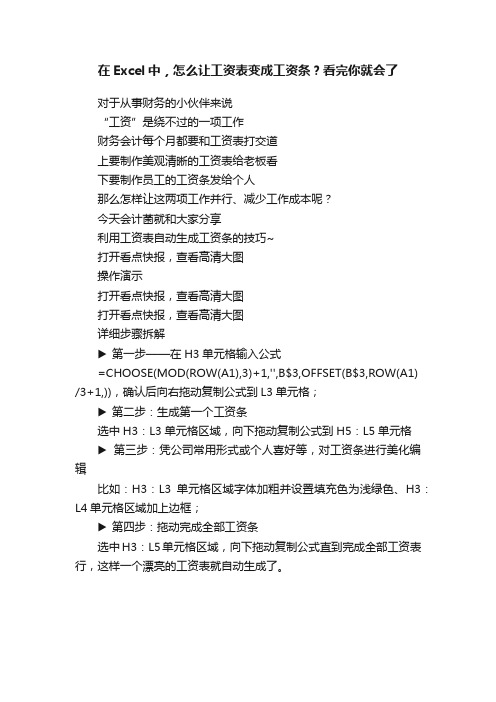
在Excel中,怎么让工资表变成工资条?看完你就会了
对于从事财务的小伙伴来说
“工资”是绕不过的一项工作
财务会计每个月都要和工资表打交道
上要制作美观清晰的工资表给老板看
下要制作员工的工资条发给个人
那么怎样让这两项工作并行、减少工作成本呢?
今天会计菌就和大家分享
利用工资表自动生成工资条的技巧~
打开看点快报,查看高清大图
操作演示
打开看点快报,查看高清大图
打开看点快报,查看高清大图
详细步骤拆解
▶第一步——在H3单元格输入公式
=CHOOSE(MOD(ROW(A1),3)+1,'',B$3,OFFSET(B$3,ROW(A1) /3+1,)),确认后向右拖动复制公式到L3单元格;
▶第二步:生成第一个工资条
选中H3:L3单元格区域,向下拖动复制公式到H5:L5单元格
▶第三步:凭公司常用形式或个人喜好等,对工资条进行美化编辑
比如:H3:L3单元格区域字体加粗并设置填充色为浅绿色、H3:L4单元格区域加上边框;
▶第四步:拖动完成全部工资条
选中H3:L5单元格区域,向下拖动复制公式直到完成全部工资表行,这样一个漂亮的工资表就自动生成了。
Excel数据获取与处理 项目14 使用宏生成工资条

VBA是一种面向对象的语言,对象代表应用程序中的元素,如工作表、 单元格、窗体等。Excel应用程序提供的对象按照层次关系排列在一起 成为对象模型。
(7) 属性
属性集用是来由描同述类的对对象象的组特成性的。,而例且如集Ra合n本ge身对也象是的一属个性对象Co。lumn、 Row、Width和Value。通过VBA代码可以实现以下功能。
37
执行Sub过程
Sub pingding()
Dim a%
a=1
步骤(3) 输入代码
Do
a=a+1
在【会员星级评定.xlsx-模块1】窗体中输If a入> 11的Then代码如右。 Exit Do
ElseIf Cells(a, 7) >= 1000 Then
Cells(a, 8) = "五星级"
(3)按下【Alt+F11】组合键。
21
认识VBA的语言结构
(1) 标识符
① 定义
标识符是一种标识变量、常量、过程、函数、类等语言构成单位的符号, 利用它可以完成对变量、常量过程等的引用。
② 命名方式
a. 字母开头,由字母、数字和下划线组成。
b. 不能包含空格、感叹号、句号、@、#、&、$。
字符串型
Byte
字节型
Boolean
布尔型
Integer
整数型
Long
长整数型
Single
单精度型
Double
双精度型
Date
日期型
Currency
货币型
Decimal
小数点型
Variant
变体型
Object
EXCEL中如何将工资表变成工资条?
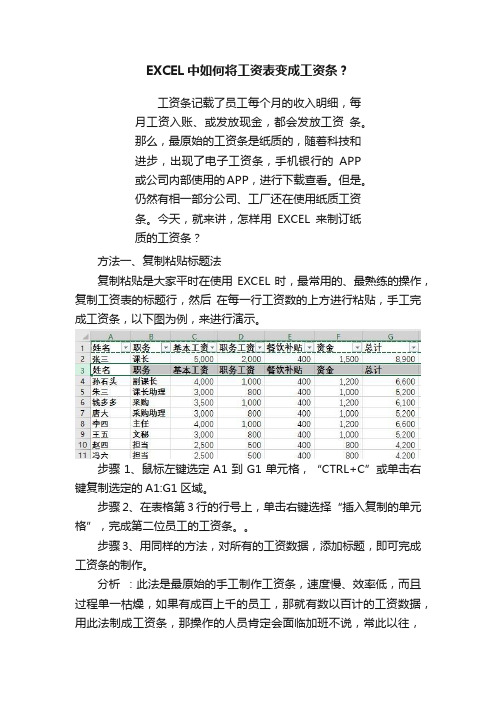
EXCEL中如何将工资表变成工资条?工资条记载了员工每个月的收入明细,每月工资入账、或发放现金,都会发放工资条。
那么,最原始的工资条是纸质的,随着科技和进步,出现了电子工资条,手机银行的APP或公司内部使用的APP,进行下载查看。
但是。
仍然有相一部分公司、工厂还在使用纸质工资条。
今天,就来讲,怎样用EXCEL来制订纸质的工资条?方法一、复制粘贴标题法复制粘贴是大家平时在使用EXCEL时,最常用的、最熟练的操作,复制工资表的标题行,然后在每一行工资数的上方进行粘贴,手工完成工资条,以下图为例,来进行演示。
步骤1、鼠标左键选定A1到G1单元格,“CTRL+C”或单击右键复制选定的A1:G1区域。
步骤2、在表格第3行的行号上,单击右键选择“插入复制的单元格”,完成第二位员工的工资条。
步骤3、用同样的方法,对所有的工资数据,添加标题,即可完成工资条的制作。
分析:此法是最原始的手工制作工资条,速度慢、效率低,而且过程单一枯燥,如果有成百上千的员工,那就有数以百计的工资数据,用此法制成工资条,那操作的人员肯定会面临加班不说,常此以往,精神也不也讲的。
方法二、分页预览法分页预览便于我们查看、调整数据,使整个页面布局更加好看,再加上“打印标题”,调整分页符,也可制成工资条。
步骤1、在“页面设置”中,选择“工作表”,在“顶端标题行”中输入$1:$1,点击“确定”完成。
步骤2、在“视图”中选择“分页预览”,用鼠标手动分页符,使每行工资数据,都有分页符,即可完成工资条的制作。
分析:比方法1省去了好多的操作,但是,每张工资条,就是一张纸,有点浪费纸张哦。
方法三、隔行插入法EXCEL作为表格处理软件,功能极其的强大。
隔行加行法就是充分利用其强大的编辑功能,首先给表格的第二行以下的数据插入行,给标题留出空间,再筛选功能,筛选出所有空白单元格,然后把标题复制粘贴到空白单元格即可完成,以下为分步演示。
步骤1、在表格的数据右侧空白处输入辅助数据,选定辅助数据,使用填充柄功能,使辅助数据填充到表格末行。
- 1、下载文档前请自行甄别文档内容的完整性,平台不提供额外的编辑、内容补充、找答案等附加服务。
- 2、"仅部分预览"的文档,不可在线预览部分如存在完整性等问题,可反馈申请退款(可完整预览的文档不适用该条件!)。
- 3、如文档侵犯您的权益,请联系客服反馈,我们会尽快为您处理(人工客服工作时间:9:00-18:30)。
用E x c e l宏实现工资表
巧转工资条
集团文件发布号:(9816-UATWW-MWUB-WUNN-INNUL-DQQTY-
用Excel宏实现工资表巧转工资条
赛迪网--中国电脑教育报
文/邓亚思
Excel具有强大的数据处理和打印输出功能,并且易学易用,是广大用户喜欢使用的电子表格处理软件。
现在一些单位的财会人员喜欢用Excel打印本单位的职工工资总表与工资条,但在Excel中要将工资总表(如表1)手工地转换为工资条(如表2)则是一件比较烦琐的事,下面是我编写的一个Excel宏,运行这个宏就可将编辑好了的工资总表很方便地转换为工资条打印输出。
在Excel中新建一个文件,将其命名为“工资表与工资条”,在工作表“sheet1”中输入并编辑好本单位职工工资总表(如表1所示)后,点击“工具”菜单→“宏”→“宏…”→输入宏名“生成工资条”→创建,输入如下的宏的各行文本,输入完成后保存该宏。
将工作表“sheet1”复制为另一个工作表“sheet2”中,使“sheet2”成为当前工作表,执行刚才创建的宏,即可很快将表1所示的工资表转换为表2所示的工资条。
宏的内容如下:
Sub 生成工资条()
Cells.Select
'选择整个表去掉表格线
Range("F1").Activate
Selection.Borders(xlDiagonalDown).Line
Style = xlNone
Selection.Borders(xlDiagonalUp).LineStyle = xlNone Selection.Borders(xlEdgeLeft).LineStyle = xlNone Selection.Borders(xlEdgeTop).LineStyle = xlNone Selection.Borders(xlEdgeBottom).LineStyle = xlNone Selection.Borders(xlEdgeRight).LineStyle = xlNone Selection.Borders(xlInsideVertical).LineStyle = xlNone Selection.Borders(xlInsideHorizontal).LineStyle = xlNone Rows("2:2").Select
'选择第2行
Selection.Insert Shift:=xlDown
'在第2行前插入一行,保持第2行
为选中状态
num=150
'总人数×3,如工资表中有100人则
为100×3即num=300
col=14
'工资表的栏数,如工资表有17栏则
'col=17
num1 = 4
Do While num1 <= num
'循环插入空行
Range(Cells(num1, 1), Cells(num1, col)).Select '选中第num1行的第1列到第col列
Selection.Insert Shift:=xlDown
Selection.Insert Shift:=xlDown
num1 = num1 + 3
Loop
Range(Cells(1, 1), Cells(1, col)).Select Application.CutCopyMode = False
'剪切复制模式无效
Selection.Copy
'复制选择区域
Range("A2").Select
'选择A2单元格
ActiveSheet.Paste
'从A2单元格起粘贴内容
num2 = 5
Do While num2 <= num
'循环插入标题行
Range(Cells(1, 1), Cells(1, col)).Select Application.CutCopyMode = False Selection.Copy
Cells(num2, 1).Select
ActiveSheet.Paste
num2 = num2 + 3
Loop
Range(Cells(2, 1), Cells(3, col)).Select Application.CutCopyMode = False
Selection.Borders(xlDiagonalDown).LineStyle
= xlNone
'定义表格边框线、内线样式
Selection.Borders(xlDiagonalUp).LineStyle = xlNone With Selection.Borders(xlEdgeLeft)
.LineStyle = xlDouble
.Weight = xlThick
.ColorIndex = xlAutomatic
End With
With Selection.Borders(xlEdgeTop)
.LineStyle = xlDouble
.Weight = xlThick
.ColorIndex = xlAutomatic
End With
With Selection.Borders(xlEdgeBottom)
.LineStyle = xlDouble
.Weight = xlThick
.ColorIndex = xlAutomatic
End With
With Selection.Borders(xlEdgeRight)
.LineStyle = xlDouble
.Weight = xlThick
.ColorIndex = xlAutomatic
End With
With Selection.Borders(xlInsideVertical) .LineStyle = xlDash
.Weight = xlThin
.ColorIndex = xlAutomatic
End With
With Selection.Borders(xlInsideHorizontal) .LineStyle = xlDash
.Weight = xlThin
.ColorIndex = xlAutomatic
End With
Selection.Copy
Range(Cells(5, 1), Cells(6, col)).Select Selection.PasteSpecial Paste:=xlFormats, Operation:=xlNone, SkipBlanks:= _
False, Transpose:=False
'接上行删除上行尾的连字符
_,复制表格线样式
num3 = 8
Do While num3 <= num
'循环复制表格线样式
Range(Cells(num3, 1), Cells(num3 + 1, col)) .Select
Selection.PasteSpecial Paste:=xlFormats, Operation:=xlNone, SkipBlanks:= _
False, Transpose:=False
num3 = num3 + 3
Loop
Rows("1:1").Select
'删除多余的一行
Selection.Delete
End Sub
以后每月要打印工资表与工资条时,只需将“工资表与工资条”文件打开,修改好工作表“sheet1”中的当月的工资总表数据后将其复制为工作表“sheet2”,并使“sheet2”成为当前工作表,执行宏“生成工资条”即可。
